Last Updated on July 16, 2023 by Staff
Table of Contents
Etymology
The Beetle Mandibles grip is so different from Standard Grip that we are almost unable to place it on the Family Tree of alternative grips. This grip is so unusual that identifying it’s closest relative is as difficult as placing the starfish in the phylogenetic tree.
However, after some research we think it is actually separated from Standard Grip by only two steps. Between it and Standard Grip sits a theoretically-possible grip that we have tentatively named the “Turncoat” grip. At the time of the writing, this theoretical Turncoat grip has not yet been observed in the wild. Just like missing-link fossils which paleontologists continue to dig up, one day this missing-link grip will be found and documented in the wild, thus formally linking Beetle Mandibles to Standard Grip.
Updated 2020-04-12: we have found the missing link! The Turncoat Grip is no longer a missing link. It is now a documented link!
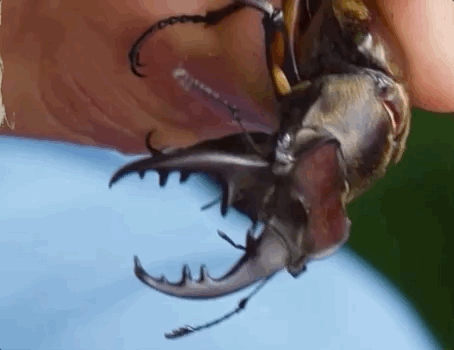
(Brave Wilderness)
The above video comparison illustrate why we named this grip Beetle Mandibles. Check out the YouTube video by Brave Wilderness on Giant Stag Beetles.
Rear ends are separated
Following pictures illustrate drastic differences in look between Beetle Mandibles and Standard Grip. Notice that despite the completely different finger dynamics and mechanical advantage, Beetle Mandibles preserves one crucial aspects of Standard Grip – it keeps rear ends of chopsticks separated. This allows its compression action to be effective. That is, food items are “pinched” by tips of chopsticks when picked up by a user.

Closing tips of chopsticks
Compared to Beetle Mandibles, alternative grips such as Dino Claws, Muppet Grip, as Scissorhand and Dangling Stick are quite ineffective. They tend to push food items away when attempting to pick items up, as shown below to the right.
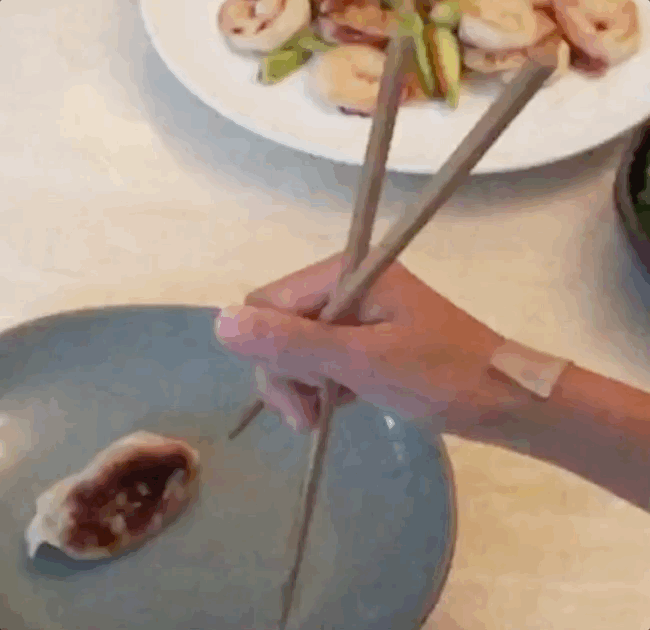
In these alternative grips, tips of chopsticks tend to be spread farther apart than rear ends, when closing in on food items. This is because rear ends of chopsticks stick together in these grips. Following pictures compare Beetle Mandibles to four different alternative grips where separation of rear ends is not honored.

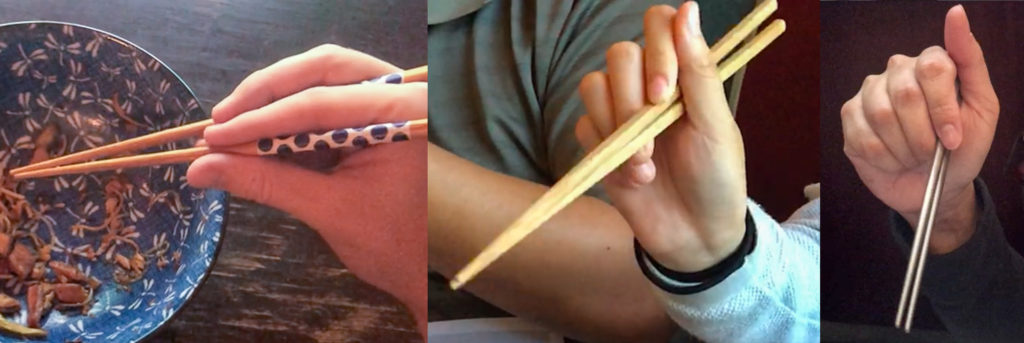
Extending tips of chopsticks
Following pictures illustrate why users of Beetle Mandibles find it relatively easy to extend chopsticks apart. Just like Standard Grip (shown on the right), the separation of rear ends allows tips of chopsticks to be extended apart, without these rear ends colliding with each other.

Compared to Beetle Mandibles, alternative grips such as Dino Claws, Muppet Grip, as Scissorhand and Dangling Stick must cross rear ends when extending tips apart, because of the lack of separation at the closed posture.


Beetle Mandibles vs. Standard Grip
Here we compare the full alternating motion of Beetle Mandibles to that of Standard Grip. Note how the Beetle Mandibles grip opens and closes tips of chopsticks sideways, while Standard Grip moves the tip of the top chopstick up and down.
Beetle Mandibles only allows a moderate extension angle, due to the anatomy of the hand and fingers. This limits its extension reach. Unlike Beetle Mandibles, Standard Grip allows a large extension angle, thanks to the planetary gear mechanism behind this grip.
Compared to Middle Path
Beetle Mandibles has a sister grip called The Middle Path Grip. These two grips may look similar, but they operate with very different finger dynamics. In some ways, perhaps they complement each other.
Both Middle Path and Beetle Mandibles generate more compression power than most alternative grips. However, they both lack strong extension power (not to be confused with extension range discussed earlier).
Footage from the Wild
Updates from 2023: This chopstick grip turns out to not be as obscure in the wild as we thought when we first wrote this article in 2020. We’ll be adding videos people send us here.
Learn new grips
Beetle Mandibles already boast a strong profile, among all alternative grips, comprising great compression power and dexterity. But a user can add Standard Grip to their repertoire of chopstick grips, which they can bring out when trying to large Chinese meat buns with chopsticks, like some of us do.
Learn to twirl chopsticks with Standard Grip, to increase the extension angle of your chopsticks. This can be done by mastering the 1-on-2-support technique for holding the bottom chopstick, and the tripod hold technique for manipulating the top chopstick.
Taiwanese: 剪仔龜
This grip is known as 剪仔龜 (chián-á ku) in Taiwanese. Some people call it 剪龜仔 (chián-ku-á) instead. 剪仔 refers to the scissors-like mandibles of the stag beetle. Stag beetles are very common in Taiwan. They can be found everywhere.
Instagram Pictures
* pictures and videos of Beetle Mandibles: courtesy of u/luqpul.

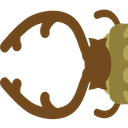
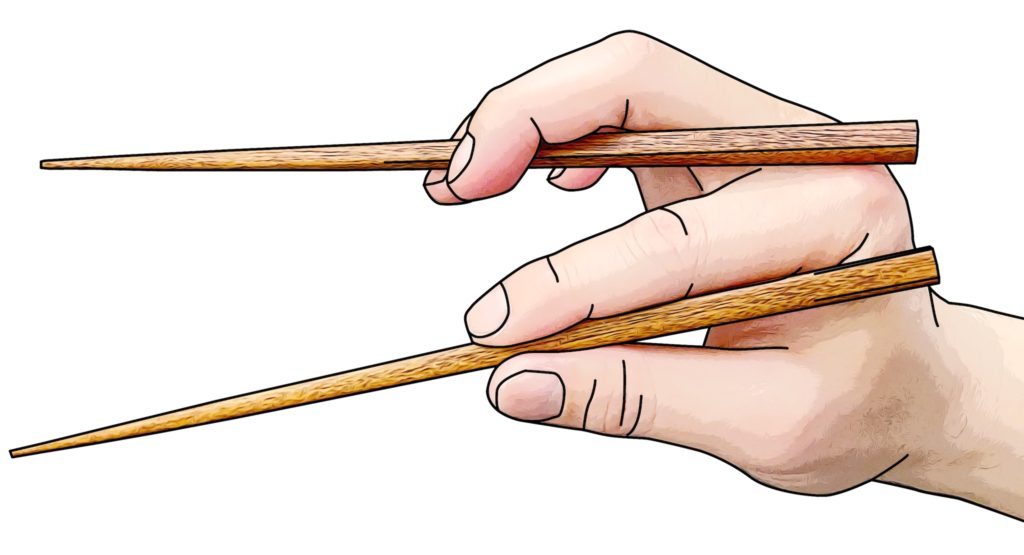
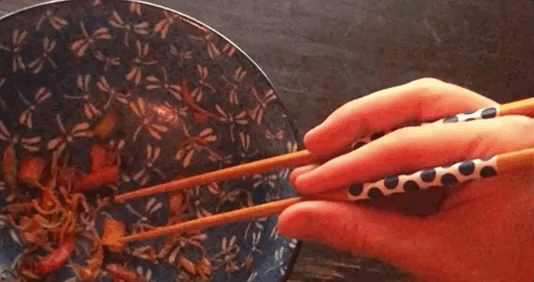
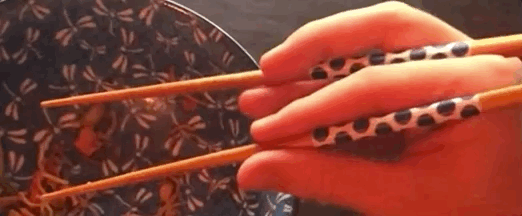
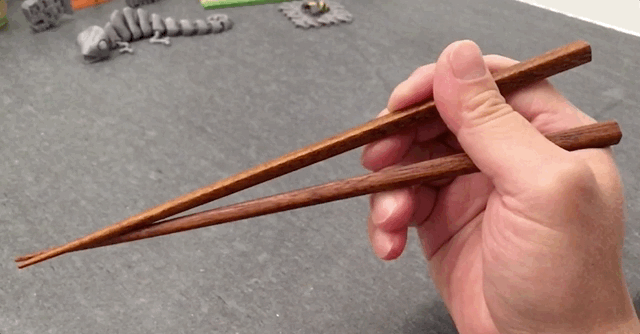
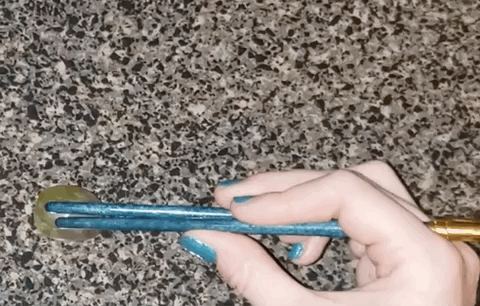
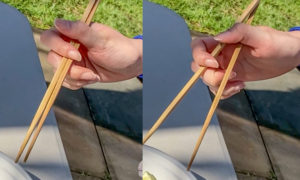
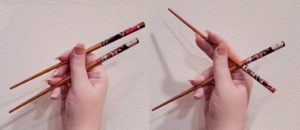

Been using this chián-á ku grip, sense my mom learned it in 1986 Peking.
Hey, you may be pleasantly surprised about how many people have said they use this grip on Reddit : )
My mom taught me to use chopsticks the way she said she was taught in a Chinese restaurant in Chicago, as she tells the story. We both use this grip, except the stick between the 3 & 4th fingers rests between the fingers the length of the stick, it doesn’t duck under the 3rd finger to rest between 2 and 3 on the back end.
Perhaps you meant the Middle Path grip? https://marcosticks.org/the-middle-path-grip/